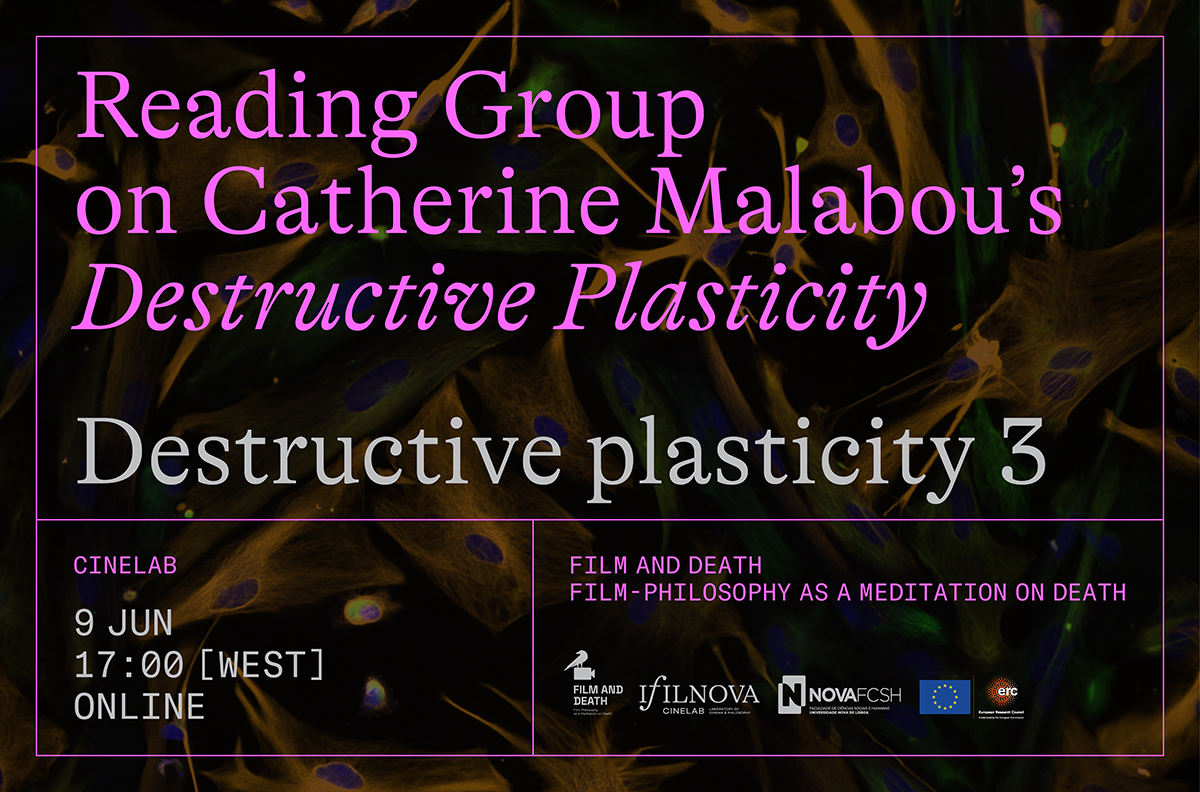Reading Group on Catherine Malabou’s “Destructive Plasticity”

Catherine Malabou first arose to prominence in the International philosophical landscape in the 1990s, thanks to her groundbreaking interpretation of G. W. F. Hegel’s system as one revolving around plasticity, which eventually became the key concept of her own philosophical production. Itself a plastic concept, plasticity (“the nature of that which is ‘plastic’, being at once capable of receiving and of giving form”) strongly informed her eventual encounters with the neurosciences (convincingly showing that Hegel and the neurosciences share a very similar, plasticity-centred notion of human subjectivity) as well as with some of the most pressing issues of our present day: among many others, artificial intelligence, anarchism (advocating a reconnection between “anarchism” and “anarchy”) and feminism (advocating a reconnection between “feminism” and the “woman”; “difference” and “essence”).
Plasticity, however, is threefold. It does not consist merely in the capability of giving form and receiving form, but also in the destruction of form as the non-transcendental condition of possibility of the other two. In order to give and take form, subjectivity needs to “explode” from time to time, and face its own erasure. This is what Malabou calls “destructive plasticity”, a key facet of plasticity corresponding to the paramount role of death in the life processes, not unlike Freud’s “death drive” but beyond Freudian and Oedipal frameworks.
This bi-weekly reading group will explore “destructive plasticity” through a selection of texts by Malabou to be commented and discussed during six one-hour seminar sessions, spread over little more than two months. The focus will be on the one hand on the tight conceptual interconnections between “destructive plasticity” and the other topics of Malabou’s philosophical production (feminism, trauma, the affect etc.), and on the other hand on its applicability for cinema.
Note that this reading group will be held exclusively online. Please register in advance before each session. After registering, you will receive a confirmation email containing information about joining the meeting. Registrants will also receive access to the texts.
Organised by Marco Grosoli, within the scope of the activities of the ERC project “FILM AND DEATH – Film-Philosophy as a Meditation on Death”. For any further questions, please write to mgrosoli@fcsh.unl.pt.
Programme
SESSION SIX: DESTRUCTIVE PLASTICITY 3 – Monday, June 9, 2025 (17h–18h UTC+1/WEST)
What is Malabou’s “negative possibility” and what distinguishes it from Freud’s denegation? Could other examples be brought up besides those Malabou gives?
Ontology of the Accident: an Essay on Destructive Plasticity, Cambridge: Polity Press, 2012, pp. 55-91.
Please register for the 6th and final session here.
Previous sessions
SESSION ONE: PLASTICITY – Monday, March 31, 2025 (17h–18h UTC+1/WEST)
Plasticity is “the nature of that which is ‘plastic’, being at once capable of receiving and of giving form”. What does Malabou mean by that? What are the philosophical roots of the concept of “plasticity”?
“The Future of Hegel: Plasticity, Temporality, Dialectic” [excerpt], Hypatia, Vol. 15, No. 4 (Autumn 2000), pp. 203-212.
“The Phoenix, the Spider, and the Salamander”, in Changing Difference: The Feminine and the Question of Philosophy, Cambridge: Polity Press, 2011, pp. 67-89.
SESSION TWO: PLASTICITY AND FEMINISM – Monday, April 14, 2025 (17h–18h UTC+1/WEST)
What does Malabou mean by “woman” and “feminine”? How is her conception of “difference” positioned within contemporary feminist debates?
“Woman’s Possibility, Philosophy’s Impossibility”, in Changing Difference: The Feminine and the Question of Philosophy, Cambridge: Polity Press, 2011, pp. 90-141.
SESSION THREE: BEYOND THE MESSIANIC: AUTOAFFECTION, HETEROAFFECTION – Monday, April 28, 2025 (17h–18h UTC+1/WEST)
How can philosophical notions like “plasticity” and “affect” build bridges between continental philosophy and neurobiology? Why is this important in the overcoming of deconstructionism?
“How is Subjectivity Undergoing Deconstruction Today? Philosophy, Auto-Hetero-Affection and Neurobiological Emotion”, in Tyler M. Williams (ed.), Plasticity: The Promise of Explosion, Edinburgh: Edinburgh University Press, 2022, 243-251.
“The Neural Self: Damasio meets Descartes”, in Adrian Johnston and Catherine Malabou (Eds.), Self and Emotional Life: Philosophy, Psychoanalysis and Neuroscience, New York: Columbia University Press, 2013, pp. 26-34.
Clayton Crockett and Catherine Malabou, “Plasticity and the Future of Philosophy and Theology”, in Political Theology Vol. 11 No. 1 (2010), pp. 16-32.
SESSION FOUR: DESTRUCTIVE PLASTICITY 1 – Monday, May 12, 2025 (17h–18h UTC+1/WEST)
What is “destructive plasticity”? What distinguishes it from Freud’s “death drive”?
“On Neural Plasticity, Trauma, and the Loss of Affects” [excerpt], in Adrian Johnston and Catherine Malabou (eds.), Self and Emotional Life: Philosophy, Psychoanalysis and Neuroscience, New York: Columbia University Press, 2013, pp. 56-60.
“Plasticity and Elasticity in Freud’s Beyond the Pleasure Principle”, in Tyler M. Williams (ed.), Plasticity: The Promise of Explosion, Edinburgh: Edinburgh University Press, 2022, 275-286.
Ontology of the Accident: an Essay on Destructive Plasticity, Cambridge: Polity Press, 2012, pp. 7-18.
SESSION FIVE: DESTRUCTIVE PLASTICITY 2 – Monday, May 26, 2025 (17h–18h UTC+1/WEST)
What can Spinoza’s conatus tell us about the neurological model of human subjectivity and about trauma in particular? What is, ultimately, an “ontology of the accident” and why ageing matters greatly in that regard?
Ontology of the Accident: an Essay on Destructive Plasticity, Cambridge: Polity Press, 2012, pp. 19-54.
Image credit: [Neurons] by [NIH Image Gallery] CC BY-NC 2.0

